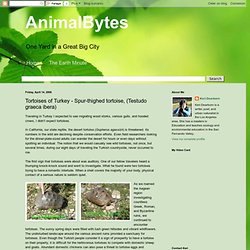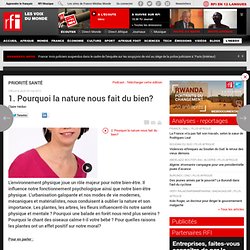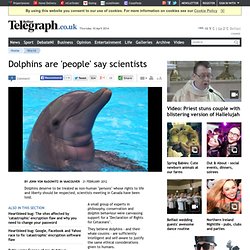

The Mind of the Dolphin pt 2 (Pete and Duane's Window - Show 4) The Mind of the Dolphin pt 1 (Pete and Duane's Window - Show 4) The Intelligence of Dolphins (Part 3) Google Afbeeldingen resultaat voor. MONTECOPIOLOTV Documentario "Italia terra del vino" (Regia Renato Mazzoli) 1982. A Low Impact Woodland Home. Tortoises of Turkey - Spur-thighed tortoise, (Testudo graeca ibera) Traveling in Turkey I expected to see migrating wood storks, various gulls, and hooded crows, I didn’t expect tortoises.

In California, our state reptile, the desert tortoise (Gopherus agassizii) is threatened. Its numbers in the wild are declining despite conservation efforts. Even field researchers looking for the dinner-plate-sized adults can wander the desert for hours or even days without spotting an individual. The notion that we would casually see wild tortoises, not once, but several times, during our eight days of traveling the Turkish countryside, never occurred to me. The first sign that tortoises were about was auditory. As we roamed the Aegean region investigating countless Greek, Roman, and Byzantine ruins, we continued to encounter tortoises.
The spur-thighed tortoise (Testudo graeca ibera) is small to medium in size–about the size and shape of a pineapple. One thing was true of all of the spur-thighed tortoises we encountered. There is something timeless about tortoises. Shiny_orchid. Pleurothallis_megalops20a. Les Plus Beaux Parcs et Jardins de France.
1. Pourquoi la nature nous fait du bien? Priorité santé 2.

Pourquoi la nature nous fait du bien? L’environnement physique joue un rôle majeur pour notre bien-être. Il influence notre fonctionnement psychologique ainsi que notre bien-être physique. L’urbanisation galopante et nos modes de vie modernes, mécaniques et matérialistes, nous conduisent à oublier la nature et son importance. Pour en parler : - Nicolas Guéguen, psychologue, enseignant-chercheur en Sciences du Comportement à l’Université de Bretagne-Sud. - Sébastien Meineri, maître de conférences en psychologie sociale à l’Université de Bretagne-Sud. - Dr Laurent Somé, psychothérapeute et homéopathe à Ouagadougou au Burkina Faso.
En fin d’émission, nous parlerons des cancers de la peau à l’occasion de Journée Nationale de prévention et de dépistage. Une erreur est survenue lors de l'envoi du mail... Le mail a bien été envoyé RFI dernières éditions. Turkey's Butterfly Bounty Documented in New Report. Dolphins are 'people' say scientists - World news, News. By John von Radowitz in Vancouver – 21 February 2012 A small group of experts in philosophy, conservation and dolphin behaviour were canvassing support for a "Declaration of Rights for Cetaceans".

They believe dolphins - and their whale cousins - are sufficiently intelligent and self-aware to justify the same ethical considerations given to humans. Recognising cetaceans' rights would mean an end to whaling and the captivity of dolphins and whales, or their use in entertainment. The move is based on years of research that has shown dolphins and whales to have large, complex brains and a human-like level of self-awareness. This has led the experts to conclude that although non-human, dolphins and whales are "people" in a philosophical sense, which has far-reaching implications. Ethics expert Professor Tom White, from Loyola Marymount University, Los Angeles, author of In Defence of Dolphins: The New Moral Frontier, said: "Dolphins are non-human persons. Read More.